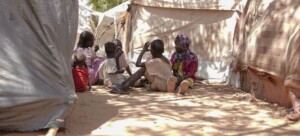Cholera cases rise in Sudan’s Blue Nile – WHO responds
The number of cholera cases in Blue Nile State has risen to 57 in various hospitals in various localities on Tuesday and Wednesday.
 Transport of cholera patients in Ed Damazin (Social media)
Transport of cholera patients in Ed Damazin (Social media)
The number of cholera cases in Blue Nile State has risen to 57 in various hospitals in various localities on Tuesday and Wednesday.
The Ministry of Health confirmed four cases of cholera in Blue Nile state. It said in a statement on Monday that the National Laboratory for Public Health notified the ministry of the presence of cholera bacteria in four of the six samples it received from infected patients in Blue Nile state. Cases of typhoid have been found as well.
Since 2017, the Sudanese government (and conniving international organisations) has consistently referred to cases suspected to be cholera as ‘acute watery diarrhoea’, in spite of solid pathological evidence (according WHO standards) of cholera. Monday’s official acknowledgement therefore represents something of a breakthrough.
New cases
The number of cases has risen in the main hospitals and the disease has spread to the area of Wad El Mahi and Geisan locality over the past two days, the Blue Nile state Doctors’ Committee said in a report on Tuesday.
The report pointed out that the number of registered cases at El Roseires Hospital reached 48. Most of the patients have recovered, while the remaining 11 cases are being treated in an isolated ward.
According to the report, Ed Damazin Teaching Hospital recorded five cases, four of which are in isolation ward.
According to the report, one case has been registered in Geisan locality, who is still receiving treatment. The report attributed the spread of the disease to the failure to take it seriously by the authorities.
The Blue Nile Doctors Committee appealed to the federal authorities to take action to contain the disease.
WHO responds to cholera cases in Sudan
The World Health Organization (WHO) is working closely with national health authorities and partners to respond to cases of cholera in Blue Nile state in south-eastern Sudan.
In a statement yesterday, the WHO confirmed that between August 28 and September 10, Sudan’s Federal Ministry of Health reported at least 51 cases of acute watery diarrhoea in Blue Nile state, including at least three deaths. Samples taken from six patients and sent for analysis to the Ministry’s National Public Health Laboratory showed that four of the six samples tested positive for Vibrio cholerae.
“Due to suboptimal health conditions and poor safe water and sewage system structures, exacerbated by polluted water sources caused by recent floods, there is a risk of cholera and other diarrhoeal diseases spreading if no immediate response interventions take place,” said Dr Naeema El Gasseer, WHO Representative in Sudan.
To monitor and contain the outbreak, WHO has surged a team of public health experts to Blue Nile State; other international experts will soon follow. The WHO team is working with health authorities to strengthen disease surveillance, provide medical treatment for patients, distribute laboratory supplies, monitor water quality and chlorinate public water supplies, and promote health education and hygiene among affected and at-risk communities. Two cholera treatment centres are treating patients in Blue Nile State, and a dedicated isolation centre has been established for cholera case management. To date, 30 patients have been discharged after receiving treatment.
Early and effective response is the best means to stopping an outbreak in its tracks. Given the timely recognition of the cholera cases by the Federal Ministry of Health with full transparency in reporting to WHO under the International Health Regulations, and the swift scale-up of response, we are hopeful that we can soon contain this disease and minimise the number of cases,” added Dr El Gasseer.
Follow #CholeraInSudan, #ألكوليرا_السودان
Radio Dabanga’s editorial independence means that we can continue to provide factual updates about political developments to Sudanese and international actors, educate people about how to avoid outbreaks of infectious diseases, and provide a window to the world for those in all corners of Sudan. Support Radio Dabanga for as little as €2.50, the equivalent of a cup of coffee.












 and then
and then